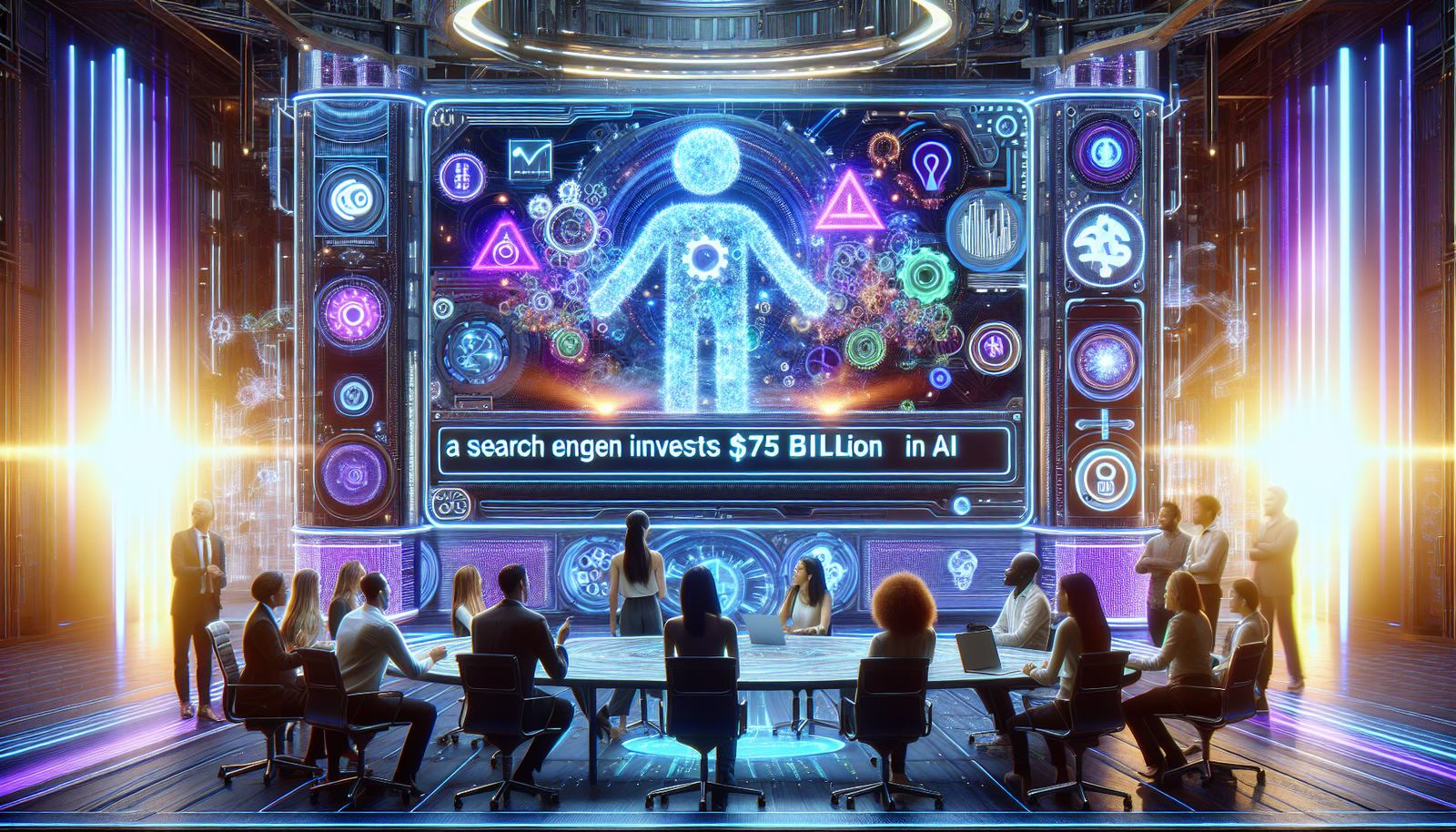Google is about to revolutionize its search engine with a monumental investment of 75 billion dollars in artificial intelligence. This financial commitment highlights the ambition of the tech giant to improve its infrastructures and integrate innovative solutions. The transformation of search into an interactive and intuitive assistance repositions Google at the heart of a digital era dominated by algorithms. The development of advanced robotic capabilities, such as those offered by DeepMind, will increase the responsiveness and relevance of results for each user. Google’s bold strategy opens a new phase of interaction between technology and its users.
An unprecedented investment in artificial intelligence
Alphabet, Google’s parent company, unveils a colossal investment of 75 billion dollars for the upcoming year, driven by its CEO Sundar Pichai. This sum will be primarily allocated to the development of technical infrastructures, including servers and data centers. These initiatives aim to enhance the integration capabilities of artificial intelligence (AI) within the company’s search systems.
Transforming Google Search into a personal assistant
Sundar Pichai anticipates a transformation of Google Search, positioning it as a true personal assistant. This process will involve the incorporation of innovative AI-based features, allowing users to formulate follow-up questions and receive contextual answers. Technologies such as Google Lens and the Gemini AI will play a central role in this journey.
By redefining interactions on its platform, Google seeks to facilitate user engagement. Exchanges will thus become more natural and fluid, mimicking human communication. This dynamic could significantly enrich the user experience.
The deep dive with DeepMind
The advances of DeepMind, Google’s AI subsidiary, also lie at the heart of the projects. Pichai mentioned multimodal systems capable of analyzing videos in real-time, promising instant responses to user questions. This technology aims to broaden the traditional scope of searches.
Exploring these technologies seems promising for Google, which plans to increase the range of use cases for its search engine. Such a system could intervene in diverse scenarios, providing solutions to complex problems by leveraging visual information.
Intelligent agents and interactive experiences
Google’s ambitions are not limited to multimodal technologies. The development of intelligent agents is at the core of their strategy. These agents will be able to interact with website interfaces on behalf of users. This advancement will facilitate access to information by automating tedious tasks, thereby eliminating the need for manual navigation.
There are also prospects for each search to become more interactive. The integration of follow-up questions would refine the quality of responses provided, transforming the search interface into a sort of sophisticated chatbot. This approach promises to increase user engagement and improve search efficiency.
Innovation outlook for the future
Sundar Pichai anticipates that the year 2025 will be marked by major innovations in the field of search. The synergy of invaluable AI developments and substantial investments will allow for the reinvention of user interactions with a dematerialized search engine.
In the face of rising competition, notably with products like ChatGPT from OpenAI, Google is making every effort to optimize its AI functionalities. This includes the implementation of AI-generated overviews for all its searches, despite some challenges like algorithmic inaccuracies.
Global context and implications
The current dynamics highlight a crucial turning point for the digital ecosystem. Google’s efforts could redefine standards for online search, aspiring for a more human interaction between users and technology. At both national and international levels, investments in AI are flourishing. Initiatives like that of French President Macron, who announced an investment of 109 billion euros, reflect the growing enthusiasm for the sector.
Google’s ambitions are accompanied by a desire to push the boundaries of artificial intelligence beyond traditional uses. The company’s collaboration with entities like Servier to transform medical research is a striking illustration. Diverse projects are multiplying, paving the way for a continuous era of innovation in the sector.
Frequently asked questions about Google’s investment in AI
Why is Google investing 75 billion dollars in artificial intelligence?
Google is investing this amount to strengthen its technical infrastructures and further integrate artificial intelligence into its search services, aiming to improve productivity and explore new opportunities offered by AI.
What are the main goals of this massive investment?
The objectives include improving the efficiency of search services, transforming Google Search into a more intuitive personal assistant, and supporting economical AI models that increase use cases.
How does Google plan to integrate artificial intelligence into its search?
Google plans to introduce AI-driven features enabling users to ask related questions and receive contextual answers, making the search experience smoother and more natural.
What will be the impact of AI on the user experience in Google Search?
The use of AI is expected to enrich the user experience by facilitating interactions and making responses to queries more relevant and personalized, as if the user were conversing with a human assistant.
What technologies does Google plan to use for this investment?
Google mentions technologies like Google Lens and the Gemini AI, which could enable the interpretation of complex visual content and answer users’ questions in real-time.
How is DeepMind’s advancement relevant to AI at Google?
DeepMind, a subsidiary of Google, is working on multimodal systems capable of interacting in advanced ways with the environment, which could open the door to innovative applications beyond simple text searches.
What benefits could intelligent agents bring to Google Search?
Intelligent agents could automate certain search tasks, simplifying access to information and making searches more interactive and personalized.
When can we expect to see the first effects of this investment in Google’s search services?
Sundar Pichai indicated that 2025 could be a significant year for innovations in search, thanks to the investments and AI developments planned.
How will this investment help Google compete in the AI field?
By proactively integrating advanced AI technologies into its services, Google hopes not only to remain competitive against other industry giants but also to establish new standards for user interaction.





